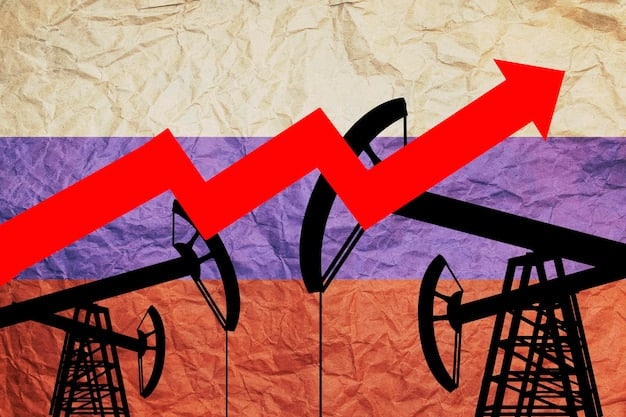Oil Prices Jump to $90: Geopolitical Impacts and Market Analysis

Anúncios
Oil prices have surged to $90 a barrel amid escalating geopolitical tensions, impacting global markets and raising concerns about inflation and economic stability in the US.
The price of oil has broken through the $90 per barrel mark, sending ripples across the global economy. Breaking: Oil Prices Surge to $90 a Barrel Following Geopolitical Tensions isn’t just a headline; it’s a reflection of the volatile geopolitical landscape and its tangible effects on energy markets.
Anúncios
Oil Price Surge: Geopolitical Tensions the Key Driver
The recent surge in oil prices to $90 a barrel is primarily attributed to escalating geopolitical tensions. These tensions create uncertainty in the market, disrupting supply chains and driving up the cost of crude oil.
The current geopolitical climate, characterized by conflicts and instability in key oil-producing regions, has significantly impacted the supply and demand balance. This imbalance acts as a catalyst, pushing prices higher as traders and consumers worry about potential shortages.
Anúncios
Impact of Middle East Instability
Instability in the Middle East, a major oil-producing region, plays a crucial role in the current price surge. Any disruption to oil production or transportation routes in this region triggers immediate market reactions.
Russian Influence and Supply Concerns
Russia’s role as a major oil exporter also contributes to the price volatility. Sanctions and political tensions surrounding Russia can impact the global oil supply, further influencing prices.

- Supply Chain Disruptions: Geopolitical tensions can disrupt the flow of oil, creating shortages and driving up prices.
- Increased Demand: As economies recover, the demand for oil increases, putting further pressure on prices.
- Speculative Trading: Traders often bet on future price movements, which can exacerbate price swings.
The combined effect of these factors creates a complex and dynamic market environment where oil prices are highly sensitive to geopolitical developments. Understanding these interactions is crucial for anticipating future price movements and their potential impact on the global economy.
Analyzing the Impact on the US Economy
The rise in oil prices to $90 a barrel has significant implications for the US economy, affecting various sectors and impacting consumer spending. Understanding these effects is crucial for navigating the current economic landscape.
From increased gasoline prices at the pump to potential inflationary pressures, the impact of rising oil prices is far-reaching. Businesses and consumers alike will feel the effects as energy costs escalate.
Gasoline Prices and Consumer Spending
One of the most immediate impacts is the increase in gasoline prices. Higher prices at the pump directly affect consumer spending, as individuals have less disposable income available for other goods and services.
Inflationary Pressures and Interest Rates
Rising oil prices also contribute to inflationary pressures throughout the economy. Increased energy costs can lead to higher prices for goods and services, potentially prompting the Federal Reserve to raise interest rates.
- Transportation Costs: Higher fuel costs increase transportation expenses for businesses, which are often passed on to consumers.
- Manufacturing Costs: Energy is a critical input for many manufacturing processes, so rising oil prices can lead to higher production costs.
- Consumer Confidence: Increased gasoline prices can negatively impact consumer confidence and their willingness to spend.
Monitoring these economic indicators is essential for assessing the overall impact of rising oil prices on the US economy. By understanding these dynamics, businesses and policymakers can make informed decisions to mitigate potential negative consequences.
How Geopolitical Tensions Affect Global Oil Supply
Geopolitical tensions directly impact the global oil supply by disrupting production, trade routes, and investment in oil infrastructure. These disruptions create volatility in the market and contribute to price fluctuations.
Conflicts, sanctions, and political instability in oil-producing regions can significantly reduce the amount of oil available to the global market. This scarcity drives up prices and creates uncertainty for consumers and businesses.
Impact of Sanctions on Oil Exports
Sanctions imposed on oil-producing countries can restrict their ability to export oil, leading to a reduction in global supply. This decrease in supply often results in higher prices for consumers.
Conflicts and Infrastructure Damage
Armed conflicts in oil-producing regions can damage oil infrastructure, such as pipelines and refineries, further reducing the available supply. The damage can be difficult and time-consuming to repair, prolonging the supply disruptions.

- Political Instability: Political instability can discourage investment in new oil projects, limiting future supply.
- Trade Route Disruptions: Tensions can disrupt key oil trade routes, such as the Strait of Hormuz, leading to delays and increased transportation costs.
- Reduced Production: Conflicts can force oil companies to reduce or halt production, further tightening the global supply.
Understanding the complex interplay between geopolitical tensions and the global oil supply is crucial for predicting future price movements and making informed decisions in the energy market. Predicting potential disruptions allows traders and consumers to prepare for price increases and potential shortages.
The Role of OPEC+ in Stabilizing Oil Markets
OPEC+, a group of major oil-producing countries, plays a significant role in influencing global oil prices. The organization’s decisions regarding production levels can either stabilize or destabilize the market depending on its approach.
By adjusting production quotas, OPEC+ aims to balance supply and demand in the global oil market. These measures, however, aren’t always enough to counteract the effects of geopolitical tensions and other external factors.
Production Quotas and Market Impact
OPEC+’s decisions on production quotas can have a direct impact on oil prices. Increasing production can lower prices, while decreasing production can drive prices higher.
Balancing Supply and Demand
The organization strives to balance global oil supply with demand to prevent large price fluctuations. However, this task is often complicated by unexpected events, such as geopolitical crises or economic downturns.
- Coordination Challenges: Reaching consensus among OPEC+ members can be challenging, as each country has its own economic and political interests.
- External Factors: OPEC+’s influence is limited by external factors, such as geopolitical tensions and fluctuations in global demand.
- Market Manipulation Concerns: Some critics accuse OPEC+ of manipulating the market to benefit its members, rather than promoting stability.
Analyzing OPEC+’s policies and their impact on the oil market is essential for understanding global energy dynamics. These policies affect not only oil prices but also the economic stability of many countries that rely on oil revenues.
Alternative Energy Sources: A Long-Term Solution?
The surge in oil prices highlights the need for alternative energy sources to reduce dependence on fossil fuels and mitigate the impact of geopolitical events. Investing in renewable energy can provide a sustainable and secure energy future.
Renewable energy sources, such as solar, wind, and hydro, offer a viable alternative to oil, reducing reliance on volatile global markets. These sources can contribute to a more stable and environmentally friendly energy supply.
Growth of Renewable Energy
The renewable energy sector is experiencing rapid growth, driven by technological advancements and increasing environmental concerns. This growth offers the potential to diversify energy sources and reduce dependence on oil.
Benefits of Renewable Energy
Renewable energy offers numerous benefits, including reduced carbon emissions, lower energy costs, and increased energy security. These advantages make it an attractive option for countries seeking to transition away from fossil fuels.
- Environmental Sustainability: Renewable energy sources produce little to no greenhouse gas emissions, helping to combat climate change.
- Energy Security: Diversifying energy sources reduces reliance on volatile global oil markets and increases energy security.
- Economic Opportunities: The renewable energy sector creates new jobs and fosters innovation, boosting economic growth.
Accelerating the transition to alternative energy sources is crucial for achieving long-term energy stability and reducing the vulnerability to geopolitical tensions affecting oil prices. Investments in renewable energy can lead to a more sustainable and secure energy future for all.
Strategies for Consumers and Businesses to Cope
As oil prices reach $90 a barrel, both consumers and businesses need to adopt strategies to mitigate the impact on their budgets and operations. These strategies can help manage costs and ensure financial stability.
From reducing energy consumption to investing in energy-efficient technologies, there are several steps that can be taken to cope with rising oil prices. These actions can help save money and minimize the financial strain caused by high energy costs.
Energy Efficiency Measures
Improving energy efficiency is a crucial step in reducing energy consumption and lowering costs. Simple measures, such as using energy-efficient appliances and improving insulation, can make a significant difference.
Adjusting Transportation Habits
Consumers can save money by adjusting their transportation habits, such as carpooling, using public transportation, or opting for fuel-efficient vehicles. These changes can help reduce gasoline consumption and lower transportation expenses.
- Reducing Energy Consumption: Turning off lights, unplugging electronics, and using energy-efficient appliances can help lower energy bills.
- Investing in Renewable Energy: Installing solar panels or using renewable energy providers can reduce dependence on fossil fuels.
- Diversifying Operations: Businesses can diversify their operations to reduce their exposure to fluctuating energy prices.
Adopting these strategies allows consumers and businesses to better manage the challenges posed by rising oil prices and ensure their financial well-being. Taking proactive steps to reduce energy consumption and diversify energy sources can help mitigate the impact of volatile energy markets.
| Key Point | Brief Description |
|---|---|
| 🌍 Geopolitical Tensions | Driving oil prices up due to supply disruptions and instability. |
| ⛽ US Economy Impact | Increased gasoline prices and potential inflationary pressures. |
| ♻️ Alternative Energy | A long-term solution to reduce reliance on fossil fuels. |
| 💰 Consumer Strategies | Adopting energy efficiency measures to save money. |
Frequently Asked Questions (FAQ)
▼
Oil prices are primarily rising due to escalating geopolitical tensions, disruptions in supply, and increased global demand as economies recover.
▼
US consumers face higher gasoline prices, impacting disposable income and potentially leading to increased prices for goods and services due to inflationary pressures.
▼
OPEC+ influences oil prices by adjusting production quotas, aiming to balance global supply and demand. However, their influence is limited by external factors and coordination challenges.
▼
Alternative energy solutions include solar, wind, and hydro power, offering sustainable and secure alternatives to reduce reliance on fossil fuels and volatile global markets.
▼
Businesses and consumers can implement energy efficiency measures, adjust transportation habits, and invest in renewable energy to mitigate the impact of rising oil prices.
Conclusion
The surge in oil prices to $90 a barrel, driven by geopolitical tensions, underscores the interconnectedness of global events and their impact on the energy market. Understanding these dynamics is crucial for consumers, businesses, and policymakers alike, as they navigate the challenges and opportunities presented by the evolving energy landscape. Embracing energy efficiency and exploring alternative energy sources are essential steps towards a more sustainable and secure future.





